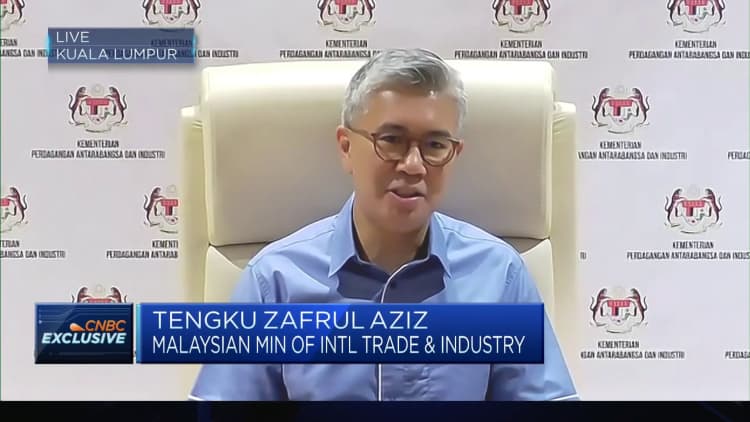
Malaysia is determined to work with both the U.S. and China, Malaysia's trade minister Tengku Zafrul Aziz told CNBC Thursday, amid ongoing tensions between the two economic giants.
His comments come as tensions between the U.S. and China escalate in recent years, over concerns ranging from trade sanctions to tech rivalry and alleged spy balloons.
"The top two investors and trading partners of Malaysia are both China and the U.S.," Zafrul told CNBC's "Squawk Box Asia" in an exclusive interview.
"What we're seeing today is Malaysia is back on the global investors' radar screen. And we have had good productive discussions with both investors and companies from China and the U.S.," said Zafrul.
He qualified that "China continues to be Malaysia's largest trading partner for 14 consecutive years" and that "China has always been the largest foreign investor into Malaysia."
On the impact of the U.S. limiting advanced chip technology, Zafrul said Malaysia "has yet to see that impact" as companies in Malaysia's semiconductor industry are "still predominantly owned by Europe and the U.S."
The U.S. and Malaysia signed an agreement to boost chip supply chain resiliency in May.
Building on China-Malaysia ties
In 2022, trade between Malaysia and China reached 17.1% of Malaysia's total global trade at 2.8 trillion Malaysian ringgit ($636.4 billion).
"We are going to ensure that what we have built over the last 50-plus years for Malaysia, especially with our relationship with China and recent visit by our prime minister .... must elevate that relationship between Malaysia and China," Zafrul told CNBC.
Malaysia's prime minister Anwar Ibrahimwas on an official trip to China last week.
China committed to a record 170.07 billion Malaysian ringgit ($38.6 billion) of investments to Malaysia during the trip, the prime minister's office said.
Anwar had told parliament Tuesday that China's Rongsheng Petrochemical will invest approximately 80 billion ringgit in a petrochemical refinery, while Chinese automaker Geely will inject 2 billion ringgit into the automotive industry, before ramping up investments at a later stage, according to local media reports.
In December last year, Anwar said the China-backed East Coast Rail Link will be continued after the project was initially scrapped in 2019. The ECRL is expected to carry both passengers and freight from the East Coast to the West Coast of Malaysia.
As a result of the cooperative projects, the relationship between China and Malaysia "has been strengthened," said Zafrul.
"We, as well, have now a more stable government in place to ensure that the policies and initiatives that we want to focus on ... be better focused on," he said.
Since he was sworn in as prime minister on Nov. 24, Anwar has pledged to fight corruption and focus on building the economy.
'Asian Monetary Fund'
Anwar told parliament Tuesday that China is open to talks about setting up a so-called "Asian Monetary Fund" with Malaysia, in order to reduce Asia's dependency on the U.S. dollar.
Zafrul pointed out that cutting Asia's dependency on the U.S. dollar is "not something that Anwar just chaired" and has been "talked about since the 1990s."
"I recently, as well at a conference three years ago, talked about the strength of the U.S. dollar and how its monetary policy has impacted countries like Malaysia, where we obviously have to deal with decisions that are made in the United States," Zafrul told CNBC.
"Having said that, [the] yuan has continued its dominance in terms of currencies traded today ... it used to be top 10, eight — now it's number five, about 7% of market share," according to the minister.
He qualified that the U.S. dollar is "obviously" still the most traded currency followed by the euro, pound sterling, and the Japanese yen.
"I think what [Anwar] is talking about is having an alternative for companies, especially those that are trading with China," Zafrul said.

